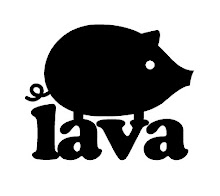Today's post is brought to us by
Compassionate Cooks & by
The Vegan Table. You can find the following article, written by
Colleen Patrick Goudreau, in her gorgeous 2nd cookbook,
The Vegan Table (also available at
LAVA!). Both of Colleen's books;
The Joy of Vegan Baking &
The Vegan Table are two of my favourite cookbooks - I really don't think a vegan kitchen is complete without these two beautiful books! They are filled with tips, food lore, ideas, stories & beautiful pictures. Please also check out Colleen's podcast "Vegetarian Food For Thought" available on itunes, and her check out all her books, cds & dvds available at
www.veganslovelava.ca. Colleen is a huge inspiration to me & I wanted to share her thoughts on Thanksgiving with you this weekend. I wish you all a joyful, compassionate, peaceful Thanksgiving filled with family, friends & delicious food from the Earth!
"The roots of Thanksgiving, a North American holiday, are in autumn harvest festivals, similar to those that take place around the world. In the United States, this holiday meal has become so centered around the consumption of turkey that people have completely lost sight of its original meaning - if they ever knew it at all.
The first Thanksgiving took place in 1621, though it was not called Thanksgiving until many years later. In face, much of what we associate with this holiday was contrived during the past few centuries.
Everything we know about the first Thanksgiving comes from two sources: a letter by Edward Winslow dated December 1621, and a book by William Bradford written twenty years after the actual events took place. His book was stolen during the Revolutionary War and didn't reappear until 1854.
In his letter, Edward Winslow wrote, "Our harvest being gotten in, our Governor sent four men on fowling, that so we might, after a more special manner, rejoice together, after we had gathered the fruit of our labors." He writes that the men hunted birds, not because the were starving but so that they might rejoice in the abundance of the fruits and vegetables with which they were blessed.
In his book, William Bradford mentions that the colonists killed wild turkeys during the autumn season; he doesn't say specifically that wild turkeys were killed for the first Thanksgiving. Although his book gives clues as to what was on this first menu, it disappeared until the mid-nineteeth century, so it didn't have any influence on how Thanksgiving was celebrated.
The animals killed for that first Thanksgiving were most likely ducks, geese, and various kinds of fish. If cranberries were served, they would have been used for their tartness or color - not in the sugary form we eat them today. Potatoes were not available, and because it is improbable that the colonists had flour for pie crust or an oven in which to bake it, pumpkin pie was most likely absent. They didn't use forks.
Does this mean we shouldn't serve mashed potatoes, pumpkin pie, sweet cranberry sauce, biscuits, or any of the things that were not on the table of the first Thanksgiving? Does that mean we shouldn't use forks? Of course not. I point this out to emphasize the fact that we selectively choose our traditions. Our emotional attachment to tradition is very powerful, so we justify our consumption of turkey at Thanksgiving by attempting to sanctify it in historical accuracy. The fact is that we eat turkeys becaust that's what we were taught and because of a woman named Sarah Josepha Hale.
Hale (1788-1879), the editor of a popular magazine, began, in 1827, a forty-year quest to make Thanksgiving a national holiday. She wrote romantic accounts of the first Thanksgiving, taking liberties to appeal to her readership and including recipes for roasted turkeys, stuffing, and pumpkin pies - none of the dishes that would have appeared on the table of the first Thanksgiving.
Although the holiday "traditions" Hale created share few similarities with the original feast, I think most of us would admit that we're not as interested in creating an exact replica of the first Thanksgiving as we are in having customs and traditions we can point to that connect us to something older than ourselves. We shape our traditions our of our ideals and pick and choose which ones we want to celebrate.
Even as the myths started by Hale began to permeate the culture's consciousness, "turkey" was still not widely accepted as the quintessential Thanksgiving dish until the mid-twentieth century. Wild turkeys - dark-feathered and thus dark-skinned - became unappetizing to consumers. To make turkey meat more appealing, the "Beltsville white" was bred in 1947 at the behest of the National Turkey Federation. Turkey consumption increased and has been increasing ever since.
Although Hale did a great disservice to turkeys - curious, playful, social birds - she did have noble ideas about the significance of this holiday. She envisioned that it would be about charity and generosity, writing, "Let us consecrate the day to benevolence of action, by sending good gifts to the poor and doing those deeds of charity that will, for one day, make every American hom the place of plenty and of rejoincing."
As we prepare our feast of seasonal fare, may we recognize that we can celebrate tradition while honoring our own values of kindness and compassion, and may we rejoice in the plenty we have without causing harm to another."




